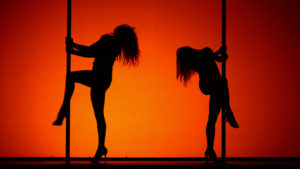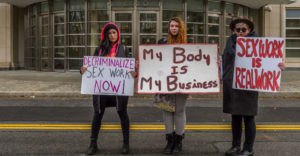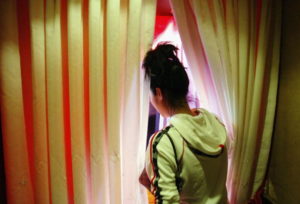One of the many clashes within the modern feminist movement is between sex-positive feminists and sex-negative feminists, otherwise known as the prudes. The former argue for the virtues of no-holds-barred sexual freedom, while the latter believe that liberal feminism’s focus on sexual freedom has come at a cost to women. To unpack this issue, UnHerd’s Florence Read spoke to two women on opposite sides of the argument: sex worker and top OnlyFans star Aella, and Louise Perry, author of The Case Against the Sexual Revolution.
Florence Read: Louise, you have made a case against the sexual revolution. What is it?
Louise Perry: My argument starts from the somewhat controversial recognition that there are some very important physical differences between men and women. Women are the ones who get pregnant; we’re much smaller than men; we’re much more vulnerable to violence in any kind of heterosexual encounter; we suffer all the negative consequences of hormonal birth control.
There are also psychological differences between the sexes, which very strong evidence suggests are at least partially innate. On average, men are much more interested in casual sex than women are, and they’re also more interested in things like watching porn, buying sex — doing all the things that have become much more socially acceptable post-sexual revolution.
The argument that I make is that even though there are plenty of exceptions to this rule, a culture of sexual hyper-liberalism suits men much more than it does women, in terms of their preferences. The sexual revolution encouraged women to imitate masculine sexuality. And that is not good for the well-being of women.
FR: Aella, you are a porn performer. Do you think that you are imitating male sexuality in your everyday work?
Aella: Yes. A lot of what you said I don’t disagree with. Porn is purchased mostly by men. Men are typically the primary consumers of the content that I create. Female purchasers of porn basically don’t exist. A good chunk of women do in fact watch porn, but don’t typically pay quite as much.
FR: What’s the problem with that? Louise, what is your issue with the male-dominated world of sexuality?
LP: One of the ways in which women are quite different from men is: we have a much lower sexual disgust threshold. It’s much easier for us to get “the ick” in a sexual encounter. Women tend to be much choosier about their sexual partners than men are. There’s a very obvious evolved reason for this: up until five minutes ago, we didn’t have access to reliable contraception, which meant that having any kind of sexual encounter could lead to pregnancy. So it makes sense that women have evolved to be choosy about who they potentially get pregnant from: is he going to hang around, is he going to be a good father?
And the problem with trying to override that choosiness — trying to have sex like a man and trying to regard sex as casual: just a leisure activity without any sort of innate meaning or specialness — is that it forces women to suppress that instinct. It often causes distress. There’s a whole genre of articles in women’s mags about how to stop yourself catching feelings — strategies that you can use during sex to dissociate almost, to not bond with your partner. It’s things like: don’t make eye contact, take certain drugs, get drunk. Just look at the orgasm gap: the fact that most women don’t orgasm in casual encounters; women are much more likely to orgasm with long-term committed partners. Often women talk about casual sex as if you have to run the gauntlet: this is a phase in your life that you have to go through, the hook up phase, on the route to a more committed relationship.
FR: Aella, you’ve described yourself as polyamorous. Do you feel that you are in distress?
A: No, not at all. Polyamory has been absolutely fantastic. But I feel like the crux of the issue is: what percentage of women are having a bad experience of casual sex? Is this thing inherently damaging? People are kind of unskilled at casual sex. I went through a couple of different phases of casual sex, and the first phase was pretty terrible, understandably. No orgasms. But if you are told often that casual sex is bad for you, you’re going to re-parse casual sex as having been bad for you.
I lived in a house full of cam girls for a year. We were very close: we worked together, we talked about our deepest hopes and dreams. And we didn’t hide anything; we bitched about it quite a lot. Fast forward almost 10 years. One of the girls happened to date a bunch of men who really don’t like sex work. And she, in my opinion, revamped her past in order to be like, “Ah, that experience was damaging for me”. And I was like: “Bitch, I was there. I heard you talking about it at the time. There was no hint that any of this was bad for you.” When you enter a culture that’s feeding you this idea that you should feel bad about what you went through, you’re going to reverse develop this narrative.
To be fair, this can happen both ways. A lot of people will try to tell women that casual sex was definitely good for them, and they should feel good about it. Any narrativising, trying to tell women what they should feel, is, in my opinion, bad.
My ideal would be to ask women: do you actually like what’s going on or do you actually not? To what degree are you just trying to conform to other people? I think that’s a message that would result in a lot of people realising that they don’t want to have casual sex. And maybe a lot of people realising that, in fact, they do.
LP: I do agree with you that the power of narrative is amazing, and we restructure our memories according to narrative. There is a phenomenon, though — I don’t know if this necessarily applies to camming — but, a lot of women who’ve done in-person prostitution (particularly the worst end: street-based, brothel-based prostitution) say that, when you’re in it, believing a narrative that it’s okay is the way you survive. It’s the way you get through what is a fairly terrible experience.
FR: There are many jobs that people do that are unpleasant, and they have to do for money. What makes sex work any different, Louise?
LP: The idea that sex is like any other kind of social interaction — comparable to working in a factory, to shaking hands, to making coffee, going surfing — I call that, in the book, sexual disenchantment. It’s this idea that comes out of the sexual revolution, that all of the religious, bourgeois, traditional norms of the past had to be done away with. The idea of sex having any kind of special status, let alone sacred status, had to be done away with in order for people to shake off the oppressive shackles of the past. And I think the problem with that idea is twofold.
One, I don’t think people believe it in the vast majority of cases. They overwhelmingly don’t behave as if sex is like anything else. There are people who do polyamory well and enjoy it. There are also, on any given platform devoted to discussion of polyamory, people really struggling with jealousy — finding it really, really difficult to suppress that instinct to view sex as being unique compared with other kinds of relationships.
And the problem with trying to pretend that sex is just like anything else: if you can’t have a special status for sex, you also can’t have a special status for rape, which we do in law. We recognise that rape is worse than theft — instinctively, and also in our legal codes. We recognise that sexual harassment has a uniquely harmful effect on its victims.
FR: Aella, do you think that sex is sacred?
A: I agree that for some sections of the population, sex is treated very seriously, and in others, it’s not. My guess is that people are much more flexible along the spectrum than you might think.
I worked at a factory — terrible hours — and then I escaped into sex work, and eventually into prostitution. After I did this, I was shocked that people had placed so much meaning on sex, in a way that prevented me from escaping terrible jobs to begin with. Because I didn’t go straight into sex work because of that meaning that people placed on it. And then when I did, I was like: “Fuck that, that meaning that people loaded up on to sex, prevented me from living basically my best life.” And I know a lot of other sex workers who feel the same way. And I’m not saying that everybody should. I also know some sex workers who tried sex work, and they were like: “Shit, I can’t not have the meaning here”.
My overall issue here is: people are pointing a laser eye at the non-standard, non-normal, deviant types of sexual approaches than they are at the conservative, socially-accepted ones. You’re correct that a lot of polyamory discussions are talking about jealousy issues, but monogamy also has dead bedroom problems. Both are relationship structures that require some sort of negotiation of your desires, and what you can achieve in your life. And both of them have pretty severe downsides. And as a sex worker, I see a huge amount of the downsides in monogamy, from men who come see me because of failures in their monogamous relationships.
FR: If you were not there to service their needs, do you think they would turn back to their partners and have a frank conversation about their sex life? Or do you think that you are offering them a way out?
A: I would ask the guys that I saw: “Are you married?” And if they said, yes, then I’d ask: “So why are you seeing me?” The general sense that I got was that most of them had wives that weren’t interested in them anymore. Basically wives that had a bunch of kids, or had health issues, and their sex drive was zero. And sometimes I would ask: “Well, have you considered bringing it up with her? Have you talked with her about it?” And the majority of their responses — I’d say 60 to 70% — were horror. They were like: “I don’t want to destroy my entire life.” It was common for guys to be like, “If I bring it up with her, I think she would leave me.”
A lot of the men had been sexless for ten years before finally trying to find a sex worker. Most men don’t feel great about making their wife unhappy, potentially, to do this. A lot of them are risking damage to their life. Most guys I talked to, I got the impression that they had made at least some effort. Some of them, no — some guys were like, “Fuck it, I don’t give a shit. Our relationship is totally separate from this, and I’m just going to fuck other people, because that’s what I want” — but it was not the majority. In fact, I got the impression that seeing these men actually probably helped save them from divorce, because their other option was leaving their wife because they couldn’t talk. So it was this safe, tiny outlet that allowed them to maintain longer, more dedicated relationships.
LP: Presumably, their wives would have left them if they’d known though. So these were secret encounters. Monogamy clearly has its downsides too, but everything in the whole entire world has trade-offs. I completely take your point that there are some people for whom polyamory is great, there are some people for whom sex work is great, there are some people who are just temperamentally much more suited to non-conventional sexual lives. But I think the other thing that I’m interested in, and which is much more difficult to talk about within a liberal framework, is how this scales.
So one of the things that I write about in the last chapter of my book is the fact that there are all sorts of ways in which societies that have a monogamous marriage system do better than societies that don’t, even though only about 20% of societies on the anthropological record have been monogamous. They tend to be more affluent, they tend to have lower rates of crime, they tend to have lower rates of spousal abuse, child abuse, compared to polygamous cultures.
A: I’m not surprised that this is the case. I would guess that if you compared polygamous cultures to monogamous cultures, monogamous cultures would probably do better.
FR: Is there an ideal when it comes to how we build our relationships? Louise, do you for example disapprove of Aella’s work as a sex worker? In your ideal society, would OnlyFans not exist?
LP: “Disapprove” is not a word I would use. I think that it is clearly the case that some individuals do well on OnlyFans. Most don’t. I think we agree on the fact that OnlyFans is insanely unequal. The vast majority of women who become content creators are not going to make any real money, and are likely to suffer negative consequences down the track. I think it would be better if OnlyFans didn’t exist. That’s not the same thing as saying that I think it should be banned, because there are obviously all sorts of downstream consequences of that kind of legislation, which might do more harm than good. I think it’d be very, very difficult to ban OnlyFans or similar sites. But I think, on balance, they have a net negative impact on society.
A: Would you agree with OnlyFans if, say, before signing up, a girl got like statistics on how likely it was for her to make various amounts of money? Like, “90% of creators make under $1,000 a month,” or something like this?
LP: I think that would be good. I imagine the platforms would not want to do that, because it’s obviously going to limit their profit-making.
The other thing that I would want a lot of naive young women to be aware of is the fact that even though men are less likely to admit to the fact that they still ascribe to the sexual double standard, they do. And I think that one of the worst consequences of OnlyFans for very many women, which isn’t talked about nearly enough, is the fact that it becomes that much harder afterwards to find a committed relationship, which actually most women say is what they want long term, because men are judgmental about it.
A: My guess is that this is very well-known in women cultures. I’ve joined so many discussion groups where girls are thinking about getting into OnlyFans, or already doing OnlyFans, and a huge amount of that discussion is centred around, “How much is this going to damage my mate prospects? How much should I hide it from my potential mates? How can I do OnlyFans in a way where it’s not going to leak to potential mates?” This, to me, is one of the top things, at least in practice that I have seen women consider. To me it doesn’t feel like an overlooked aspect at all.
FR: Doesn’t that suggest we should be driving towards a more sexually open society? Because I suppose if we got into a place where nobody had any taboos around sex work, then we wouldn’t have to deal with that problem.
LP: I think that the nature of human beings is such that we seem to have a very strong instinct towards regarding sex as being special. Men seem to have a very strong instinct towards mate guarding. Trying to dissuade people from feeling this way is a serious uphill struggle. Any kind of political project based on the idea that we can undo human nature is one that’s doomed to failure. I think that we do still basically have minds evolved for a hunter-gatherer life, because that’s 90% of our species’ history.
A: I think that this is probably why women are very into BDSM — because evolutionarily, and historically, you had to be aroused by powerful men in order to survive. But also, to some degree, a lot of it is quite cultural, too. We’ve seen a lot of different sexual structures throughout history. I do think that we have a little bit more flexibility.
FR: Both of you seem to be arguing there that there’s a certain amount of nature involved here and we’re trying to push against nature, and to impose social norms upon it. Is there an argument for letting nature run riot and just allowing people to tap into their most primal selves?
LP: I think the problem with absolute liberation — just allowing people to do whatever feels right to them — is the fact that some people have dark, destructive, horrible desires. Actually, probably a lot of people do. Human sexuality is not necessarily nice and pro-social at all. So you have to think about how you’re going to manage the desires of people when that desire is destructive to others.
The other problem is: one sex is much more vulnerable inherently than the other sex. How you manage that asymmetry is, I think, a question that all civilisations have grappled with. And no one has ever come up with a free-for-all as the best solution, because clearly it wouldn’t actually work.
FR: Digital sex work might be an answer there, though. Aella is behind a screen: she is, in many ways, invulnerable to male violence, and she is being paid for sexual acts, which she finds pleasurable, I assume. And so, isn’t that a win-win?
LP: Or, a step further, sex robots. Then there would be no ethical issues in terms of consent. It would bypass all of the feminist arguments over sex work that’ve been going on for so long. The focus is normally on the effects on women, though. And I actually think that having a class of men who basically just spend all day indoors, playing video games, and having sex with their sex robots seems like a fairly bleak future for that portion of mankind.
A: It seems nicer if they can have access to real women. I would be sad. I used to do OnlyFans, but to be clear, I’ve also been an IRL prostitute, and have been subject to male violence. But out of all the sex-work forms that I have done, the in-person feels the healthiest to me, for both me and the men. The others feel like some sort of weird, warped version of human interaction that objectifies us both more. And sure, it’s safer to some degree, but you can take steps to be safe in-person. In my opinion, in the healthiest future society, the dominant form of sex work would be human to human, eye contact, skin contact, just like God intended.
FR: What about these sex robots? That’s certainly not what God intended, but it’s a lot safer for everyone involved, isn’t it?
A: I like the idea of sex robots existing. I think if men can have an outlet that they need that is affordable and accessible to them, this seems good. I’m generally pro people independently pursuing what they want. And if that’s sex robots, then go for it.
FR: But do you think that the skin to skin contact, as you said there, is superior to this kind of digital sex work that we’re talking about?
A: Yeah, absolutely. Because it feels really dehumanising, like I said, for both parties. With OnlyFans, I’m not dealing with a man, I’m dealing with the collection of men. I’m dealing with the statistical likelihood of a man clicking on this thing. It’s very robotic. And similarly, this is encouraging men to treat women the same way. You have like a billion women, and it’s just like cycling through them. You’re not really developing a relationship with any of them.
And again, I am pro people pursuing what they want, in their own time. I’m happy OnlyFans exists. But I noticed it was much better for my mental health to do it in person. It just felt so much better and more fulfilling to be able to touch an individual person.
FR: There used to be quite high barrier to entry for sex work, if you’re talking about street prostitution. Whereas now, with things like OnlyFans, the barrier has been lowered massively. Is it a good thing that more and more people have access to a sex-work career?
A: Yeah. I know a bunch of single moms or women with health issues — women who are struggling to feed their kids on their own — who said, “Oh, I tried OnlyFans, and it gave me, not even that much money, an extra $300 a month, but now I can pay my rent.” There’s a whole bunch of people for whom their lives are really drastically improved by that amount of money. Typically people who are really disadvantaged in some way. It disproportionately assists the poor, or people I would consider to be lower-class — people who were culturally priced-out of the better paying jobs — which is why I think this worked for me so well. I grew up very, very conservative, no access to education, and so a lot of people are like, “Oh, well you should just go to college and get an education, and then get a job.” For some people, their lives just don’t work like that. And for some people being able to have easily-accessible side income that you don’t need training for, or elite approval or credentials, is incredibly beneficial and life changing. And I’ve known so many women for whom this is the case.
LP: I take that point, although I do think it’s worth emphasising the fact that drug and alcohol addiction is extraordinarily common among sex workers. The OnlyFans end of the spectrum is clearly the much less dangerous, traumatic end of it. But it’s also not representative of the whole spectrum of sex work, some of which is dire. And it’s very, very common for women to end up taking drugs and using alcohol as a way of dealing with the emotional fallout of prostitution. And that means that you’re not actually ending up in a better situation at all: you end up potentially spiralling downwards and getting stuck.
I’m not really a radical feminist at all – I think I can comfortably speak for radical feminists, though, in that they tend to think no woman should be in a situation where she can’t feed her children unless she’s doing sex work. I do recognise that we live in the real world and there are situations where that might seem like the best option. The other problem is that because lay people’s understanding of the sex industry tends to be very poor, it can be very difficult to know how you will find prostitution until you’ve actually done it. So saying at the outset, “I think I’m well suited to this, I think it will be fine. I’ve read through my checklist of warnings, and I think it’s fine,” isn’t actually quite the same as actually doing it.
When you make a move towards normalisation, de-stigmatisation, and presenting this as a perfectly valid career route, you are going to end up with people going down that career route for whom it is an absolute disaster and it ruins their lives.
A: There’s a lot of talk about alcohol and drug stuff with sex workers – which I agree is true, they have much higher rates of drug use. But if, say, we have a world where we dramatically criminalise something like plumbing — like, plumbers are really stigmatised and if you plumb then people are like, “I’m not sure I want to date you”, and if you get assaulted as a plumber, you can’t go to the police otherwise they’ll put you in jail — I would expect the kind of people who would gravitate towards plumbing are people who are unsuccessful in other aspects of their life, and probably have problems with drug and alcohol use. My guess is correlation, not necessarily causation.
LP: I agree with you that clearly the stigma makes all sorts of things worse in all sorts of ways. But also, I’m not convinced that the stigma is an after effect of the law. I think that actually the stigma seems to stick to the sex industry, across time and place. And I think it comes back to this problem of the socio-sexuality gap requiring a prostituted class of women. Most women don’t want to be in that class. It’s very hard to persuade anyone to think that that isn’t a bad outcome for those women and the stigma flows from that.
A: It feels like you’re implicitly telling women that they should feel bad for these things. I wish I could hear more, “Yeah, some woman are like that and if you’re not, it’s chill.” When you were talking about prostitution I was like, “Well, you should just try it once or twice and see how it works for you, and if you don’t like it, then stop.” If you have a bad experience, it doesn’t seem to me like it needs to be traumatising. But if we treat it with this level of like gravitas, then it’s going to create that trauma in people. And I wish that when I was in a really sex-negative culture, I could have heard more messaging about how it’s okay to be sexually promiscuous if you want to. If I had been surrounded by people giving me the kind of message that you’re giving me, I think I would have ended up with a lot more shame and guilt overall.
LP: I acknowledge that it can seem condescending and judgmental — the anti-porn, anti-prostitution feminism — but we all know that the really brutal attitudes towards sex workers come overwhelmingly from sex buyers. I’m sure there are exceptions, but we know that men who buy sex are more likely to be sexually aggressive, more likely to admit to rape outside of the sex industry. I think the problem with the effort to de-stigmatise, in the hope that we will somehow arrive at a sex industry that really is just like any other industry, is: it is basically based on theory. It’s based on the faith that all of the stigma is causing the problem, not that stigma is attached to the innate problem, which actually has much more to do with the fact that most women find prostitution very distressing and most sex buyers don’t treat the women they buy sex from with proper respect.
FR: Louise, do you think that you are part of a new movement? Is there a sex-negative movement? You said earlier that you’re not a radical feminist — so what would you call yourself? Are you a conservative?
LP: The key way I guess in which I diverge from radical feminism is I don’t believe in the blank slate. I don’t think that the differences between men and women are a consequence of socialisation. I don’t think that they can be just dissolved away. I think that we have to deal with the existence of these differences on a psychological level as well as a physical level, and kind of progress from there. I’ve arrived at some conclusions which some traditionalists agree with me on — not all of them by any means. I guess maybe this is a materialist form of feminism, in the sense that it’s coming out of the recognition that these material differences exist and we have to make our peace with them.
We are reckoning with these vast material changes. The one that I’m primarily interested in, in my book, is the pill. I don’t accept this idea of the great woman theory of feminist history, where the thing that drives feminist change is particularly charismatic women. There clearly have been charismatic women, but I think the thing that’s driven change for women has primarily been technological — the washing machine, the tampon, whatever you want to name.
And the points, if you look at the history, when you see feminist thinking flaring up, tend to be at the points where you have some important material flux. So you have the internal combustion engine and you have suffrage, and you have the Second World War and the move away from industrial economy and then you have the second [feminist] wave. And I think now, possibly, there is another flare up, and there’s another reckoning with feminist ideas, because we’re seeing the next revolution, which is the online revolution. And it’s really important to be thinking about sexual difference in that space, because it may appear as if we are just these genderless economic units who can all participate in the knowledge economy on a completely even footing and stuff, but actually sexual difference exists. And it will persist until I guess the transhumanists finally have their way.
FR: And Aella, do you feel that you’re an agent of change in this revolution that Louise is talking about?
A: An agent of change? I feel like I just want to defend people like me. It feels, especially in recent years, like I’m fighting against this push of people disrespecting me solely because of my sexual promiscuity and the way that I like to approach sex. And it feels like there’s more shame and judgement about it. I don’t know if it’s just because I’m exposed to different places of the internet or if this is actually a movement, but I feel really protective of it. I’m like, “No, I am okay the way that I am.” And I really want to give that message to anybody who’s like me. Living like me can be a wonderful, healthy and fulfilling and you don’t have to feel shame, or like you need to hide. And so if there’s people like me out there, I really want to take a stand and have a bold, unapologetic ownership of that. And that feels like the thing that I’m fighting for.
Disclaimer
Some of the posts we share are controversial and we do not necessarily agree with them in the whole extend. Sometimes we agree with the content or part of it but we do not agree with the narration or language. Nevertheless we find them somehow interesting, valuable and/or informative or we share them, because we strongly believe in freedom of speech, free press and journalism. We strongly encourage you to have a critical approach to all the content, do your own research and analysis to build your own opinion.
We would be glad to have your feedback.
Source: UnHerd Read the original article here: https://unherd.com/








